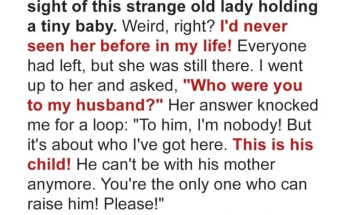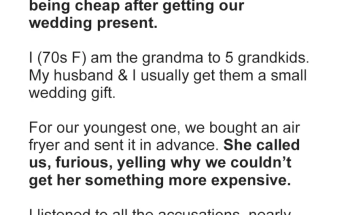
When our mother got sick, my sister Rachel was the one who stepped in to care for her. At the time, I thought I knew exactly why. I thought Rachel was doing it to make herself look good — the same way she always did. She had a history of putting herself first, of doing what was convenient for her and ignoring everything else.
But what happened in those final days — especially the words my mother whispered to the doctor just before she passed — changed everything I thought I knew.
I learned the truth far too late. And it broke my heart.
My Sister and I Were Never Close
Growing up, Rachel and I were opposites. I was the dependable one — focused on school, career-driven, always helping Mom out around the house. Rachel was more free-spirited, always going out, missing chores, disappearing when it mattered most.
After our father left, Mom raised us alone. She worked hard, sometimes too hard, and expected the same from us. I took that seriously. Rachel didn’t. As the older sister, I always felt like I carried the weight — and she just floated through life.
We drifted apart after high school. Rachel took odd jobs, moved around a lot, while I went to college, got married, and started a family. We spoke occasionally, mostly out of obligation.
By the time Mom started getting ill, Rachel and I hadn’t had a meaningful conversation in years.
Mom’s Health Took a Sudden Turn
It started slowly. A little fatigue, some forgetfulness. Then she began having trouble with her heart. She was diagnosed with a chronic illness that required close care — and just like that, things got serious.
I lived out of state with my husband and kids, managing a busy job and household. Rachel, on the other hand, had moved back to our hometown and lived only ten minutes from Mom.
Before I could even offer help, Rachel stepped in.
She moved into Mom’s house and became her full-time caregiver.
I didn’t understand why. Rachel had never been the nurturing type. She wasn’t the one who took Mom to appointments or helped with groceries over the years. That was always me, even from a distance.
So naturally, I assumed she had a motive.
She Took Control — And I Felt Pushed Out
Rachel handled everything. She coordinated with the doctors, scheduled the appointments, picked up prescriptions, and stayed by Mom’s side around the clock. I offered to help — to take turns, to split the responsibility — but she said she had it under control.
I made weekend trips when I could. But I was never as involved as she was.
And every time I visited, I felt like an outsider. Rachel made decisions without me. She spoke to the nurses as if she were the only daughter. When I suggested something, it was always met with a polite dismissal — “Thanks, but we already tried that.”
It was infuriating.
I began to think she was just trying to be the hero. That she was making up for years of being absent by swooping in at the end to earn some sort of redemption.
And I wasn’t about to play along.
The Final Weeks Were a Blur
As Mom got worse, Rachel barely left her side. She bathed her, fed her, read to her, and slept in a chair next to her bed. I would come for a day or two, offer support, and go back to my life.
I felt guilty, sure. But I also resented Rachel for turning Mom’s final weeks into her one-woman show.
Then, one afternoon, I confronted her.
“You don’t have to do all this alone,” I told her. “Let me take over for a few days.”
Rachel didn’t even look up from the pill organizer. “You don’t know her meds. You don’t know her routine.”
I felt my face flush. “You think you’re the only one who cares?”
“No,” she said quietly. “But I’m the only one who’s been here.”
That stung more than I expected.
Mom’s Last Night
I wasn’t there when it happened.
Rachel was.
The call came in the early morning hours. A nurse told me Mom had passed peacefully in her sleep. Rachel had been there the whole night.
I drove in, heart pounding, eyes blurry from tears. When I arrived, Rachel was sitting next to Mom’s bed, her hand wrapped around Mom’s.
The room was calm. Silent. It felt like something sacred had just happened.
A doctor came in to speak with us. He was kind, gentle. After giving us his condolences, he paused.
“She had a moment of clarity before she passed,” he said softly. “She couldn’t speak much, but she asked me to pass on a message.”
Rachel and I both looked up.
He said, “She said, ‘Tell my daughters I love them both… but tell Sarah the truth — Rachel saved me.’”
I didn’t understand at first.
“What does that mean?” I asked, my voice shaking.
The Truth Comes Out
Rachel didn’t speak right away. She just sat there, staring at Mom.
Then, she began to cry.
“I didn’t want you to know,” she said through her tears. “Not like this.”
“What are you talking about?”
“She got worse months before anyone knew,” Rachel whispered. “She hid it from everyone — even you. But I saw the signs. I convinced her to go to the doctor. I started taking care of her long before she told anyone how bad it really was.”
I stood there in stunned silence.
Rachel went on. “She didn’t want to be a burden. She didn’t want you to worry, with your job and the kids. She asked me to keep it quiet.”
I sat down. My legs wouldn’t hold me.
“She told me,” Rachel said, “that she wished she’d been there more when I was growing up. That she regretted how distant we were. We talked about things she never said to anyone else. She told me she was proud of you. She just didn’t want to take anything more from you.”
Tears filled my eyes. Not just for Mom — but for Rachel, too.
I’d gotten everything wrong.
I Misjudged Her
Rachel hadn’t taken care of Mom to impress anyone. She didn’t do it for praise, or guilt, or redemption.
She did it because she was there.
Because Mom needed her, and she showed up.
I had spent so long painting her as the unreliable one, the selfish one. But when it mattered most — when everything was on the line — Rachel gave everything she had.
And in those final months, Mom saw her. Loved her. Trusted her.
She saved her.


